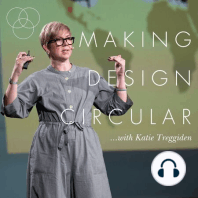60 min listen
Aya Haidar
ratings:
Length:
37 minutes
Released:
Jun 15, 2021
Format:
Podcast episode
Description
I’m talking to Aya Haidar. As a self-described 'mother, artist, and humanitarian,' her creative practice focuses on found and recycled objects, through which she explores themes of loss, migration and memory. She has studied art at Chelsea College of Art and Design, The Slade School of Art – part of University College London – and School of the Art Institute of Chicago, before undertaking a Masters in Non-Governmental Organisations and Development at the London School of Economics and Politics Science. She has exhibited all over the world, with international solo and group shows in London, Berlin, Jeddah, Paris, Dubai and Turkey – as well as being involved in charity and social engagement projects.We discuss:- How life and resources were not disposable in previous generations. - What are some of the connotations of the word 'mending'?- Work that is politically and socially engaged, but not necessarily political.- How we are living lives that are so fast and disposable there isn't time to slow down.- Why social media is giving us the chance to connect with mending and sustainability topics.… and more!Here are some highlights. The notion of repair has often been out of necessity, not choice."Because my parents fled during the war they left everything behind. My mother is very frugal, I think because they had to leave everything behind. The sense of not wasting anything is so much a part of her. And she definitely passed that on to me. And my grandmother, right through her whole life until the day she died. I think it is a generational thing, being born in 1920 in Lebanon, I don't think it was a choice. Life then wasn't as disposable as it is now. You mended things. You knitted a jumper and if it got too small you took it apart and you re-knitted it in a larger size."Terrible things should not be forgotten."Terrifying things need to be remembered because they can still affect people very much emotionally because it's their childhood, it's everything that they've lived. For me it's about embellishing this and filling in these cracks with all these beautiful threads. And in a way these colorful threads also highlight it. These bullet holes and these cracks cannot be forgotten. The problem with that is you can go back into a cycle where you cover it up and you replace these old buildings with these beautiful new buildings we have and in some way the new generation forgets what it's been through."Mending has a unique place in environmental sustainability."One thing I've learned is that if you look at these refugee communities, every tiny bit of scrap is used. You have a bed sheet that then becomes a wrap and then becomes a dress and then becomes a head scarf and then becomes a bag. It becomes so many things before it's ever thrown away. Then it becomes a little doll for the child because it can take on so many forms and I believe there is a lot that can be learned from that. We live in such a disposable society now with such cheap clothing and it's so dangerous and it's so unsustainable. Looking at these communities and how they respect their materials, honor them, and constantly breathe new life into them, it's something so positive and something I hope will influence whomever it rubs off on. Her work is politically and socially engaged, but not political. "With all of my work I am not interested in the bigger geopolitics. What I'm doing is picking the stories that are silenced and have fallen through the cracks. What comes out are these incredibly raw and personal stories of mothers having to choose between their children at border crossings. Someone is sharing with you and entrusting you with these stories. I'm interested in the mother who had her baby ripped from her hands and thrown into the sea so the whole boat doesn't get caught by police patrols. This is a story that gets re-shared every time I tell it because these personal stories are what humanize these political situations. My work is politically engaged because it enga
Released:
Jun 15, 2021
Format:
Podcast episode
Titles in the series (42)
Chris Miller: This season is all about repair and in this episode, we’re talking to Chris Miller the co-founder of Skinflint – Europe’s leading vintage industrial lighting website. Skinflint scours locations across the world to source historic vintage lights, which are restored with a gentle touch by UK-based lighting experts, ensuring their stories shine through. As recommended by Metro, The Week, Wallpaper and FastCompany. by Making Design Circular with Katie Treggiden
